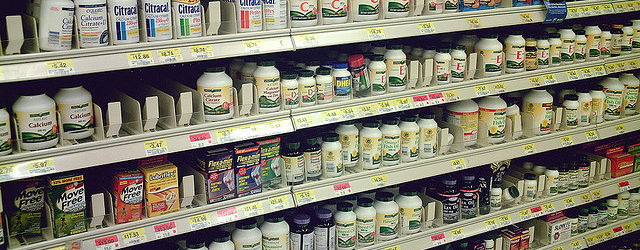It was all over the news recently; you saw it and it made your heart jump a little with fear. The New York State attorney general’s office investigated supplements on the store shelves from major discount stores like Wal-Mart and Target(1). They found that the supplements did not contain what was listed on the label and were actually contaminated with other ingredients. The investigation was prompted by a New York Times article published in 2013 titled “Herbal Supplements are not Often What They Seem” (2) . So you pick up the gingko biloba supplement at the store hoping that it will enhance your memory, but instead, you end up buying a concoction of pulverized radish and houseplant and ending up in severe stomach pain because the product also contained wheat-which you can’t tolerate and avoid like the plague (even though it was labeled gluten free).
 Where do you purchase your supplements? Did this news flash make you think twice about the supplements you are currently taking? This subject is near and dear to my heart, because as a dietitian and functional medicine practitioner, I use supplements myself and recommend them to my patients. I have done a lot of research to figure out which supplements to recommend, because I want the best outcome for my patients. This article is one part of a 5 part series about commercial dietary supplements. In this particular article, we will discuss how supplement companies are regulated, and how you can make an informed decision when purchasing dietary supplements.
Where do you purchase your supplements? Did this news flash make you think twice about the supplements you are currently taking? This subject is near and dear to my heart, because as a dietitian and functional medicine practitioner, I use supplements myself and recommend them to my patients. I have done a lot of research to figure out which supplements to recommend, because I want the best outcome for my patients. This article is one part of a 5 part series about commercial dietary supplements. In this particular article, we will discuss how supplement companies are regulated, and how you can make an informed decision when purchasing dietary supplements.
Part 1 Popularity of Dietary Supplements
Today, the popularity of Dietary Supplement usage by Americans has continued to increase due to an ever growing and more health conscience population. According to a survey conducted in October of 2014 by the Council for Responsible Nutrition, 68% of adults reported taking some form of dietary supplements, and 50% of those surveyed were taking supplements on a regular basis (3). For many people, information and education about their dietary supplement comes from commercials, advertisements and word of mouth. But what are you really getting when you purchase a bottle of supplements? Why does magnesium glycinate cost twice the amount of magnesium citrate? Should you go with the cheaper brand?
Along with the number of people found to use supplements, the survey conducted by the Council for Responsible Nutrition also found that 83% of users feel confident in the safety, quality, and effectiveness of the Supplements they purchase (4). However, there is much confusion as to what actually qualifies a supplement as a “Quality Dietary Supplement”. The average consumer and many Health Care Professionals are not aware of the current regulations governing dietary supplements.
There are hundreds and hundreds of supplement companies selling hundreds of different products. As Health Care Professionals and consumers we really need to be aware of the regulations which dictate the dietary supplement industry, and how we can make informed decisions concerning the safety and quality standards the supplement industry must comply with.
Governmental Regulation of Dietary Supplements
Before a drug is marketed, it must undergo rigorous testing to determine the safety and efficacy of the drug. Dietary supplements are not held up to such a strict standard. The Dietary Supplement and Health Education Act (DSHEA) was enacted in 1994 to define nutritional supplements as food, not drugs.Under the DSHEA act, manufacturers (not the FDA) are responsible for ensuring that their supplements are safe, and not adulterated or misbranded.
The FDA declares that dietary supplements may not claim to diagnose, cure, treat, or prevent a disease. You will see this statement typically on the package or website of the particular supplement. Therefore, a supplement can’t claim that if you take their product, it will cure your cancer, but they can and will say that their product will boost your immune system.
Both the FDA and the Federal Trade Commission (FTC) have jurisdiction over the advertising of supplements which includes regulations governing claims, labeling, advertising, and packaging of( 5).Currently, the FDA regulates dietary supplements as food, not as drugs. This allows the supplement industry to sell supplements to the public without approval of the FDA. Although many companies meeting certain criteria must register with the FDA before producing or selling any supplements.
Basically, any supplement found to be adulterated or misrepresented on the label is subjected to regulatory action from the FDA AFTER it reaches the market. If you think about it, it would be impossible for the FDA to police every food manufacturer and to test their products before hitting the store shelves. That is why you here about recalls AFTER the fact. The same holds true for nutritional supplements-since they are considered food, they are not subject to the same rigorous oversight as drugs are.
An example of a product that was recalled in 2010 by the FDA was a supplement containing Bee Pollen (6). The product was marketed as a weight loss supplement. The product was recalled for containing undisclosed Sibutramine and/or Phenolphthalein compounds. Sibutramine was an appetite suppressant that was discontinued in 2010 due to increased risks of seizures, heart attacks, arrhythmia and strokes. Phenolphthalein is used as a laxative but is not approved for use in the United States due to potentially serious gastrointestinal disturbances, irregular heartbeat, and cancer. Now let’s get real here. There are far, far fewer adverse events from taking supplements than there are with drugs, thus the reason why drugs are so highly regulated. However, you still don’t want to throw your hard earned money away on ground up houseplants.
To help make sure that supplement companies are walking a straight line when it comes to manufacturing practices, in 2010 the FDA required all supplement companies to adopt Current Good Manufacturing Practices(cGMPs). The Federal cGMPs requires that all persons manufacturing, packaging, holding, and distributing supplements establish and follow cGMPs to ensure product quality and truth in labeling. However, the FDA cannot enforce every supplement manufacturer to ensure that they are following cGMP standards. Since this rule was enacted there have been reports alerting the public to inappropriate manufacturing practices by supplement companies. Findings from an FDA inspection of 450 supplement manufacturers were published in the Chicago Tribune in 2012. Serious, widespread manufacturing errors and non-compliance to cGMPs were found in nearly half of the manufacturers inspected ( 7), In part two of this series I will I explain how supplement companies are regulated by non-governmental agencies and what you can do as a consumer to make an educated purchase.
1) (http://well.blogs.nytimes.com/2015/02/03/new-york-attorney-general-targets-supplements-at-major-retailers/?hp&action=click&pgtype=Homepage&module=first-column-region®ion=top-news&WT.nav=top-news)
2) (http://www.nytimes.com/2013/11/05/science/herbal-supplements-are-often-not-what-they-seem.html)
3) http://www.crnusa.org/consumersurvey/
4) http://www.crnusa.org/CRNPR14-CRNCCSurvey103014.html
5) http://www.consumer.ftc.gov/articles/0261-dietary-supplements5
6) http://www.fda.gov/Drugs/ResourcesForYou/Consumers/BuyingUsingMedicineSafely/MedicationHealthFraud/ucm234592.htm
7) http://articles.chicagotribune.com/2012-06-30/news/ct-met-supplement-inspections-20120630_1_dietary-supplements-inspections-american-herbal-products-associationIn part II




Mr WordPress says:
Hi, this is a comment.
To delete a comment, just log in and view the post's comments. There you will have the option to edit or delete them.